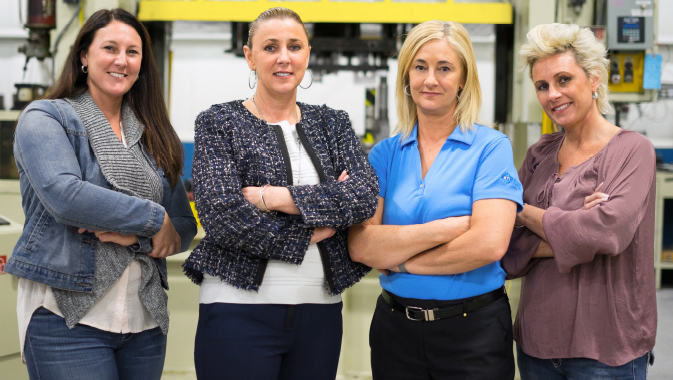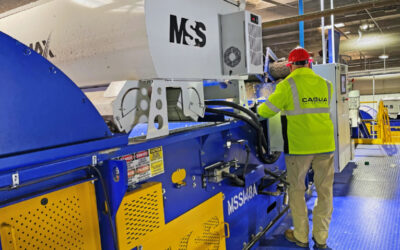From prototype to assembly line, PTM Corporation delivers exceptional service to customers – and safety to automobile drivers and passengers.
~
There are many life-savers out there: doctors, firefighters, paramedics. But what about the people who build the airbags in our cars? After all, airbags are critical safety devices just like seatbelts. The gas-inflated cushions are built into the steering wheel, dashboard, door or seat of the car with a crash sensor that triggers a rapid expansion to protect you from the impact of an accident.
In fact, the National Highway Traffic Safety Administration says that airbags have saved more than 28,000 lives in the U.S. alone. That’s a very satisfying number for the team at family-owned PTM Corporation in Fair Haven, Michigan. PTM Corporation produces prototypes and then manufactures the components and assemblies that supply Ford, General Motors, Honda, Toyota and a whole host of original equipment manufacturers (OEMs) as well as Tier 1’s.
Making vehicles safer and taking pride in the work that makes it happen is a big part of the company culture at PTM, and they’ve been doing it for almost 50 years.
“People have to feel part of something bigger than ‘I am just doing my job,’” says Donna Russell-Kuhr, PTM President, CEO and Co-Owner. “‘I am providing an airbag component that’s going to save a 16-year-old’s life.’ Those are the things I want people to feel. ‘I was part of that rail that was engineered so when that car crashed, it absorbed a lot of the energy, the airbag was deployed, the side curtains were deployed. We help our customers save lives here.”
PTM, now a close-knit, 300-strong company, has produced billions of metal stampings for clients, from small clips and fasteners to car roofs and mower decks. What sets the team apart from Michigan’s numerous metal stamp companies? They are problem-solvers, acting as an extension to a client’s engineering department for metalworks, to test and resolve issues before launching production.
Half of its core business is prototypes, research and development, and helping customers create those products. The other half is the production side, taking prototypes into mass production. PTM also serves customers who need emergency services when things don’t go according to plan on the assembly line, says Russell-Kuhr.
There are many steps that go into manufacturing a vehicle. There’s the design that goes into every part, then there’s the tooling, testing before going into production. And in the course of all this, sometimes things are missed. PTM steps in to diagnose problems and re-engineer parts to get production back on track.
One highlight project is car rails, the “bones” of the car, highly complex assemblies that are challenging to design and manufacture because they have as many as 50-plus parts that create this complex assembled rail. The bumper connects to the rails, so the rails directly affect the impact from serious accidents.
Here’s the thing: Rails are engineered to collapse, helping to soften the crash. The company produced rails for a large OEM in the metro Detroit area, stamping their own high-strength, low carbon materials, and marrying all these parts together into sub-assemblies and then into a large assembly. “That is not easy to do,” Russell-Kuhr says. We worked closely with an OEM and went through the whole product line together. We have since become their preferential supplier for rails.”
PTM recently introduced a new 1,000-ton press to expand large prototypes into production. Investing in machines of this scale is part of the company’s growth strategy. Investing in people is another focus. The company partners with local high schools, and on robotics teams to help them train the next generation of skilled trades. PTM is also developing its workforce with a journeyman program, hiring high-school juniors and seniors to learn the trade skills on the job to lead to full-time positions without incurring the debt of a college program.
“We pay them as they go, and they reach milestones. Plus, they get their insurance paid once they become full-time. We recruit younger new millennials and we give them an opportunity to learn and contribute which in time provides them a skill set that is very valuable not only to the company but in the industry. It’s an alternative method to obtain a higher education.”
Donna Russell-Kuhr came on board PTM full-time in 1982. She also serves as president of the Board of Directors for the Economic Development Alliance of St. Clair County. She was awarded Crain’s Detroit Business Notable Woman in Manufacturing Award for 2018, is certified by the Women’s Business Enterprise National Council (WBENC) and was the Great Lakes Women’s Business Council 2017 Michigan WBE of the year.
For this strong woman, leading the way in auto manufacturing is just what she does. “I’m a metal manufacturer and I just happen to be a woman. My dad gave me nothing but an opportunity. He made you work for it and there were very few thanks in between. I think that has helped me to get where I am.”
Her dad grew up on a farm in Mississippi but knew he didn’t want to be a farmer. He moved north in the late 1960s where it was booming with automotive. “My dad was an engineer at heart though he never went on to get his degree. Everybody liked him; they called him Charlie Hustle, because he wouldn’t take ‘no,’ for an answer. He would have multiple machines running. So that’s how he grew when he was working and his boss said, ‘You should just open up your own place, Charlie, and if you do, I’ll give you some work.’” That was in 1972, the early days of PTM. Russell-Kuhr’s father passed away in 2016.
Since then, PTM has seen ups and downs of the auto industry, including the darker times of the recession in 2008. But momentum is once again building in a new direction, and the company’s outlook is very strong.
Looking ahead, Michigan is fast becoming a hub for autonomous and connected vehicles. Detroit and Ann Arbor are among the top five cities for jobs in the self-driving car industry.
“I think it’s as exciting today as it probably was back when we were replacing horse and buggies with this thing called a vehicle,” Russell-Kuhr says. “In the next few years, we are going to see exciting technologies. The OEMs and the new players for mobility are positioning themselves for how mobility is powered, autonomous, or semi-autonomous.”
Russell-Kuhr has positioned PTM for a different kind of future.
“We have to be very nimble so that we can adapt to this new mobility – whatever it’s going to be. And that’s where we have positioned ourselves with a nice diversity of customers. We have to adapt new technology to be part of the emerging markets.”













